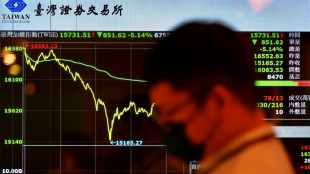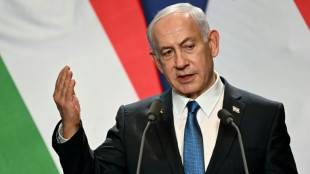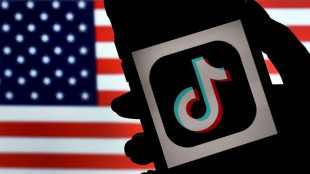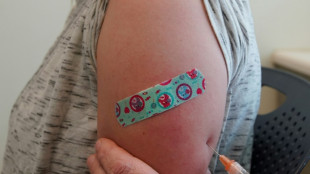
-
 Equities savaged as China retaliation to Trump tariffs fans trade war
Equities savaged as China retaliation to Trump tariffs fans trade war
-
Sara Duterte back in Philippines after month with detained father

-
 Netanyahu and Trump to talk tariffs, Iran and Gaza
Netanyahu and Trump to talk tariffs, Iran and Gaza
-
Max power, Tsunoda's mixed debut, quick Kimi: Japan GP talking points

-
 Luis Enrique's revolution leaves PSG stronger without the superstars
Luis Enrique's revolution leaves PSG stronger without the superstars
-
Messi on target but Miami held by lowly Toronto

-
 Inter's bold treble bid bumps up against past glory at Bayern Munich
Inter's bold treble bid bumps up against past glory at Bayern Munich
-
Sagstrom digs deep to win LPGA Match Play

-
 The music industry is battling AI -- with limited success
The music industry is battling AI -- with limited success
-
New app hopes to empower artists against AI

-
 Haiti jazz festival is rare respite for violence-racked capital
Haiti jazz festival is rare respite for violence-racked capital
-
Johnson satisfied after opening Grand Slam series event

-
 China would have agreed TikTok deal if not for US tariffs: Trump
China would have agreed TikTok deal if not for US tariffs: Trump
-
Market panic mounts as world scrambles to temper Trump tariffs

-
 Harman keeps calm in the winds to clinch Texas Open
Harman keeps calm in the winds to clinch Texas Open
-
Doncic scores 30 as Lakers rout Thunder

-
 Qualifier Brooksby stuns Tiafoe to win first ATP title
Qualifier Brooksby stuns Tiafoe to win first ATP title
-
McLaughlin-Levrone seals Grand Slam jackpot with 400m victory

-
 Juventus miss out on Serie A's top four with Roma draw
Juventus miss out on Serie A's top four with Roma draw
-
Marseille, Strasbourg win in Ligue 1 to close in on Champions League

-
 Pegula wins WTA Charleston after Kenin collapse
Pegula wins WTA Charleston after Kenin collapse
-
Second US child dies of measles, almost 650 ill: officials

-
 Thousands attend funeral of legendary Malian musician Amadou
Thousands attend funeral of legendary Malian musician Amadou
-
Gaza rescuers say Israeli strikes kill 44

-
 Alcaraz admits pressure to take Sinner's number one ranking 'killed' him
Alcaraz admits pressure to take Sinner's number one ranking 'killed' him
-
US storms, 'devastating' flooding death toll climbs to 17

-
 Ovechkin achieves the 'impossible'
Ovechkin achieves the 'impossible'
-
Comeback man Siraj's 4-17 helps Gujarat to hat-trick of IPL wins

-
 Ovechkin scores 895th goal to clinch all-time NHL record
Ovechkin scores 895th goal to clinch all-time NHL record
-
No 'killer instinct' as Man Utd, Man City play out derby stalemate

-
 Siraj's 4-17 helps Gujarat to hat-trick of IPL wins
Siraj's 4-17 helps Gujarat to hat-trick of IPL wins
-
Man City held by Man Utd in derby stalemate

-
 'Minecraft Movie' strikes gold to dominate N.America box office
'Minecraft Movie' strikes gold to dominate N.America box office
-
World scrambles to temper Trump tariffs as market fears mount

-
 Strasbourg close in on Champions League with Ligue 1 win at Reims
Strasbourg close in on Champions League with Ligue 1 win at Reims
-
Toulouse overpower Sale to reach rugby Champions Cup last eight

-
 Slot shocked by sloppy Liverpool errors in Fulham defeat
Slot shocked by sloppy Liverpool errors in Fulham defeat
-
Zelensky slams US lack of response to Putin truce rejection

-
 Juric urges Southampton to learn from record-setting relegation
Juric urges Southampton to learn from record-setting relegation
-
Italian director Moretti leaves hospital after heart attack

-
 Chelsea's 'unfair' schedule to blame for Palmer axe: Maresca
Chelsea's 'unfair' schedule to blame for Palmer axe: Maresca
-
Barrios grabs Atletico late Liga win at Sevilla

-
 Le Pen slams 'witch hunt', vows not to give up at Paris rally
Le Pen slams 'witch hunt', vows not to give up at Paris rally
-
Liverpool's rare loss delays title march, Southampton relegated

-
 World scrambles to temper Trump tariffs: White House
World scrambles to temper Trump tariffs: White House
-
Southampton relegated from Premier League in record time

-
 Fulham end Liverpool unbeaten league run to delay title party
Fulham end Liverpool unbeaten league run to delay title party
-
Torrential rains kill dozens in DR Congo capital

-
 Pogacar wins Van der Poel duel at cycling's Tour of Flanders
Pogacar wins Van der Poel duel at cycling's Tour of Flanders
-
Djokovic plays down Monte Carlo hopes after eye infection

| BCC | 0.85% | 95.44 | $ | |
| RBGPF | 100% | 69.02 | $ | |
| SCS | -0.56% | 10.68 | $ | |
| NGG | -5.25% | 65.93 | $ | |
| VOD | -10.24% | 8.5 | $ | |
| RYCEF | -18.79% | 8.25 | $ | |
| CMSC | 0.13% | 22.29 | $ | |
| JRI | -7.19% | 11.96 | $ | |
| CMSD | 0.7% | 22.83 | $ | |
| RIO | -6.88% | 54.67 | $ | |
| RELX | -6.81% | 48.16 | $ | |
| BCE | 0.22% | 22.71 | $ | |
| GSK | -6.79% | 36.53 | $ | |
| AZN | -7.98% | 68.46 | $ | |
| BTI | -5.17% | 39.86 | $ | |
| BP | -10.43% | 28.38 | $ |

Making smartphone data anonymous no longer enough: study
Privacy measures that are meant to preserve the anonymity of smartphone users are no longer suitable for the digital age, a study suggested on Tuesday.
Vast quantities of data are scooped up from smartphone apps by firms looking to develop products, conduct research or target consumers with adverts.
In Europe and many other jurisdictions, companies are legally bound to make this data anonymous, often doing so by removing telltale details like names or phone numbers.
But the study in the Nature Communications journal says this is no longer enough to keep identities private.
The researchers say people can now be identified with just a few details of how they communicate with an app like WhatsApp.
One of the paper's authors, Yves-Alexandre de Montjoye of Imperial College London, told AFP it was time to "reinvent what anonymisation means".
- 'Rich' data -
His team took anonymised data from more than 40,000 mobile phone users, most of which was information from messaging apps and other "interaction" data.
They then "attacked" the data searching for patterns in those interactions -- a technique that could be employed by malicious actors.
With just the direct contacts of the person included in the dataset, they found they could identify the person 15 percent of the time.
When further interactions between those primary contacts were included, they could identify 52 percent of people.
"Our results provide evidence that disconnected and even re-pseudonymised interaction data remain identifiable even across long periods of time," wrote the researchers from the UK, Switzerland and Italy.
"These results strongly suggest that current practices may not satisfy the anonymisation standard set forth by (European regulators) in particular with regard to the linkability criteria."
De Montjoye stressed that the intention was not to criticise any individual company or legal regime.
Rather, he said the algorithm they were using just provided a more robust way of testing what we regard as anonymised data.
"This dataset is so rich that the traditional way we used to think about anonymisation... doesn't really work any more," he said.
"That doesn't mean we need to give up on anonymisation."
He said one promising new method was to heavily restrict access to large datasets to just simple question and answer interactions.
That would get rid of the need to classify a dataset as "anonymised" or not.
P.Silva--AMWN